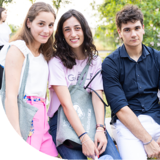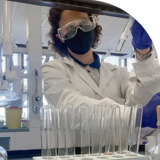The new LM-87 programme in Social work and service coordination for immigration, poverty and lack of self-sufficiency, delivered in a blended mode, prepares social workers, experts in the implementation and evaluation of aid projects and social interventions, as well as managers and coordinators, specialised in the field of social work, to support and protect adults in conditions of severe distress, with particular reference to the issues of immigration, poverty and lack of self-sufficiency.
The degree programme is interdisciplinary and aims to strengthen the scientific, cultural, methodological and technical-professional competences needed to work in the context of aid.
The graduate degree programme in the LM-87 class qualifies students to sit for the State Exam for Section A of the Register of Social Workers (specialist level) and is the natural continuation of the L-39 programme in Social Work Sciences.
In order to ensure close contact with the professional world, the graduate programme has set up a Technical Committee with representatives from institutions and organisations active in the social and socio-medical services sector.
Learning objectives
The teaching and integrative teaching activities aim to:
- foster understanding of demographic, economic, political, psychological, and sociological phenomena useful to recognise the factors and dynamics that generate and nurture problems, hardships and inequalities at personal, family and community level;
- stimulate the acquisition of theoretical and applicative content for the design, implementation and evaluation of social and welfare projects, services and interventions;
- promote the adoption of a Relational Social Work approach and methodology, which has been promoted and studied for years at Università Cattolica, and is based on the deep valorisation of the resources and potential of individuals, families and communities in the co-construction of aid programmes.
The internship plays a significant role in the degree programme: it facilitates the focusing of the thematic area for the dissertation. It consists of an experience in which the student offers a Service, an organisation or a community his/her collaboration in order to think, organise and realise a participatory interventional project, which can focus on the realisation of social work, social research or middle management activities. The internship is carried out with the support of the programme professors/lecturers who are specially appointed to act as tutors and who follow the students both individually and through group meetings.
The format
In order to make it easier for students away from home to carry out professional training activities, the Faculty, by exploiting the extensive and consolidated network of relationships with public and private local services, promotes and facilitates internships in the local communities where the students live.
Programme details
Blended learning
The new study programme is designed in a blended mode, also to encourage enrolment of working students already engaged in Welfare Services or about to enter the world of work.
Specifically, the blended formula translates into: between 40% and 50% distance activities; between 50% and 60% face-to-face teaching.
Each course in the study plan is taught in accordance with the above-mentioned balance, with the exception of internship and laboratory activities, which are carried out entirely in person.
Throughout the programme, a high degree of student-faculty interaction will be maintained in asynchronous and synchronous modes, also through the use of dedicated methodologies and tools.
Teaching methods, workshops and internships
The degree programme has a strongly interdisciplinary nature. In order to integrate theoretical knowledge and methodological-professional competences, the programme is characterised by a wide range of workshops, guided exercises, seminars and opportunities to meet with experienced social workers, managers, users and family members.
Message from Professor Guido Merzoni Dean of the Faculty of Political and Social Sciences - 31 march 2021
Dear students,
my colleagues and I feel all the fatigue and tribulation you are facing these months. After so many hopes of a restart, in academic activity and even more so in social life, we still find ourselves distant, in a condition of mutilated humanity.
We try to be close to you, above all and, we hope, tangibly, with the commitment to organize teaching as best we can, in compliance with the given constraints.
Please don't give up! To paraphrase an English poet of the twentieth century, don't give up because you have friends, a company, and there’s a place, a community, where we belong. I am convinced that the end of the nightmare is no longer far away. Please, continue to attend the courses, to actively participate in online lessons, to study, to discuss, as far as possible, with your colleagues, to interact even if at a distance with the teachers. Let us work together so that this time is not suspended and the journey continues.
Some practical indications:
- after the Easter break, lessons will resume, in the manner that the pandemic framework will allow, according to the schedule and pre-established timetable. We hope to be able to return to dual mode soon, which however presupposes the relocation of the campus site in the “orange zone”. As usual, you will receive information in this regard on the University's information channels. When the dual mode resumes we will return to the week planning followed for the first weeks of the second semester;
- for the Laurea magistralis final exams scheduled between 7 and 9 April, the possibility of taking the exam in person will in any case be guaranteed to all students who have requested it and wish to confirm their orientation. If Lombardy were in the orange zone, it will be possible for undergraduates to be accompanied by a maximum of 5 people, as expected. If, on the other hand, Lombardy were in the red zone, unfortunately it will not be possible to allow the presence of accompanying people. In that case, those who wish to change their orientation on presence can do so by communicating it to the competent offices;
- as you have seen, for students aiming at taking their final exam in the academic year 2019/2020 who were unable to finish the final papers or theses in time for the March-April session, an extraordinary session has been scheduled between 7 and 10 June. The specific dates are available in iCatt and on the dedicated web pages;
- as for the exams of the summer session, the schedule is confirmed, but the uncertainties related to the health situation are still such that it is not possible to define, to date, a certain scenario on the methods of delivery. In that respect, notice will be given as soon as possible.
I send you my sincere wishes for the upcoming Easter. May it be an opportunity for regeneration starting from the heart of each one!
Guido Merzoni
Dean of the Faculty of Political and Social Sciences





